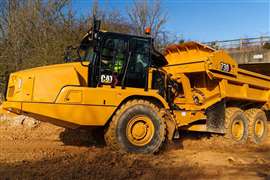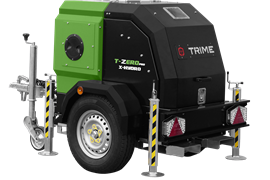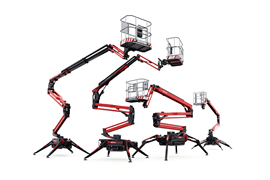Read this article in French German Italian Portuguese Spanish
4 ways Ashtead is improving sustainability
09 January 2024
The Ashtead Group released its annual Sustainability Report, highlighting objectives surrounding goals to support its people, the environment and the local communities it serves.

Ashtead Group plans to reduce its greenhouse gas emissions by 14% over last year, according to its 2023 Sustainability Report which outlines the company’s primary objectives for lowering its carbon footprint.
London-based Ashtead Group is on a growth trajectory, currently on course to expand its Sunbelt Rentals network in North America to 1,234 locations by April 2024 as part of its Sunbelt 3.0 plan. The company has expressed a strong commitment to sustainability, aiming to not only reduce emissions, but also to modernize its operations in the name of safety, inclusivity and community outreach.
Here are four areas where Ashtead is focusing its sustainability efforts.
1. Protecting people through safety
According to Ashtead’s Sustainability report, the company has established an employee wellness approach called Engage for Life. Part of an overall safety program, it includes ‘PowerUp’ to get employees ‘ready to go’ every morning.
“Our safety performance remains excellent, with our total recordable incident rate (‘TRIR’) in North America again being less than one, and our wellbeing initiatives are making work life ever better for our colleagues,” CEO Brendan Horgan stated in the repot. “Our TRIR result is even more impressive when you take into account our rate of growth through greenfields and bolt-ons, where we have to embed our safety culture from scratch. Our ‘Engage for Life’ program was “amplified” this year, taking it to the next level in terms of embedding it deeper within our culture.”
Ashtead continues to invest in training and development, including online courses. A total of 1.2 million training hours were delivered in 2023.
The company’s pursuit of a more diverse and inclusive workforce took a step forward with the establishment of its Diversity, Equity and Inclusion Task Force and a women’s employee resource group across North America.
“First and foremost, safety is our leading priority,” the report states. “We continue to look for ways in which we can enhance further our safety policies and procedures and have improvement plans in a number of areas, including enhancing how we monitor and measure performance, and how we can use technology to enhance safety across the business.”
2. Reducing carbon intensity in the environment
Ashtead’s primary environmental goal is to reduce Scope 1 and 2 carbon intensity per $m of revenue by 35% by 2030 and to hit an interim target of 15% by 2024.
“We are focusing our effort on company-owned vehicles, which account for around 80% of our greenhouse gas emissions from operations,” the report says. “We continue to work as a partner in innovation with our equipment suppliers to develop and bring to market more efficient, electric and lower-impact machines. We are also increasingly delivering integrated and environmentally responsible rental solutions for our customers.”
In FY 2023, Ashtead said it will take delivery of a range of electric light and heavy commercial vehicles (‘EVs’) to test in operations. To enhance carbon reporting, the company is measuring Scope 3 carbon emissions from its supply chain and customers’ use of rented equipment.
“We believe that protecting the environment and investing in the greenest rental fleet possible will deliver competitive advantage for our business,” according to the report.
Approximately 20% of Ashtead’s rental fleet is comprised of battery, electric, hybrid and solar-powered assets. These include assets such as electric scissor lifts and tower lights.
A total of 10% of Ashtead’s UK fleet is now powered by biodiesel.
3. Supporting communities through outreach
Sustainability is not just about reducing carbon emissions. It can also include corporate support of local communities through effective recruitment of personnel, as well as emergency support when needed.
“We continue to open new stores, bringing opportunities through recruitment, economic activity and a new avenue for local support into these communities,” according to the report. “Our emergency response team continued to grow and we were able to support, often as a first responder, in times of crisis. We maintained some of our long-term charity partnerships, investing in key initiatives and supporting through our employee volunteering days.”
During Sunbelt 3.0, Ashtead planned to open 298 new locations, offering more possibilities for positive impact through career creation, volunteering, supporting local causes and responding to emergencies.
Recognised as a Top-50 military-friendly employer, the company says it will continue its work with charitable partners to support local communities.
4. Leading with ESG
With the launch of Sunbelt 3.0 and a commitment to leading with environment, social and governance (ESG), Ashtead says it strengthened its governance in this area with the board of directors assisting in monitoring our ESG initiatives through the work of the Group Risk Committee, which meets twice a year and is chaired by Chief Financial Officer Michael Pratt and includes the group’s managing director for ESG.
“We also established a new share-based incentive plan for Sunbelt 3.0 that applies to Ashtead’s top 400 leaders, of which 20% is linked to ESG performance and the achievement of specific environmental and employee engagement goals,” the report says.
Further, 20% of ESG goals are embedded in remuneration through a share-based incentive plan for Sunbelt 3.0.
The report stresses that 44% of its board of directors are female.
“We will remain focused on the risks of modern slavery on our business and ways in which we can further enhance our efforts in this area,” Ashtead’s report states. “We are paying particular attention to those parts of our business where we have a higher reliance on temporary labor, such as in our scaffold business in North America or our traffic management business in the UK.”
The reports goes on to say Ashtead will continue to review the sustainability and diversity of its supply chain and prioritize this where possible. Enquiries of suppliers are made when entering into supplier relationships and refreshed on an ad hoc basis, depending upon the level of business the company undertakes.
Looking ahead
Ashtead’s goals are formidable in the short term, and no less so in the years to come. The 2023 Sustainability Report states the company’s goal is to achieve net-zero carbon emissions by 2050.
Likewise, it aims to increase female representation in senior leadership to 30% by 2025.
STAY CONNECTED



Receive the information you need when you need it through our world-leading magazines, newsletters and daily briefings.
CONNECT WITH THE TEAM












